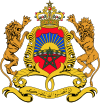| History of Morocco |
|---|
 |
Sharifism is a term used to describe the system in pre-colonial Morocco in which the shurafā' —descendants of the Islamic prophet Muhammad (through his grandson Hasan ibn Ali, in the case of Morocco[1])—held a privileged religious and political position in society.[2] Those who claimed this lineage were regarded as a kind of nobility and were privileged, in the words of Sahar Bazzaz, "as political agents, as interlocutors between various sectors of society, and as would be dynasts of Morocco."[2] They were additionally believed to possess baraka, or blessing power.[2] Claiming this lineage also served to justify authority; the Idrisi dynasty (788-974), the Saadi dynasty (1510-1659), and the 'Alawi dynasty (1631–present) all claimed lineage from Ahl al-Bayt.[3]
- ^ Gottreich, Emily (2020). Jewish Morocco: a history from pre-Islamic to postcolonial times. London. ISBN 978-1-83860-361-8. OCLC 1139892409.
{{cite book}}: CS1 maint: location missing publisher (link) - ^ a b c Bazzaz, Sahar (2010). Forgotten saints: history, power, and politics in the making of modern Morocco. Cambridge, Mass.: Harvard University Press. ISBN 978-0-674-03539-3. OCLC 467355120.
- ^ Cite error: The named reference
:1was invoked but never defined (see the help page).